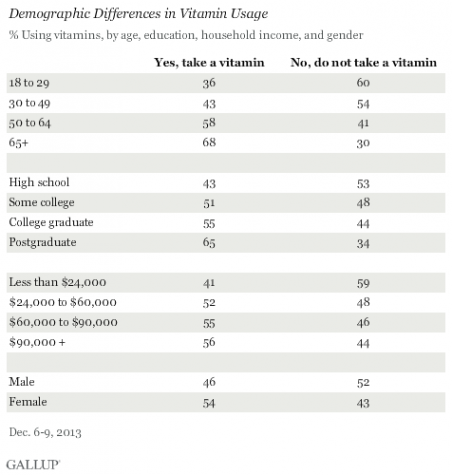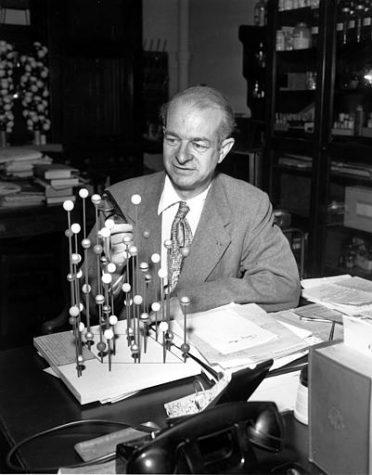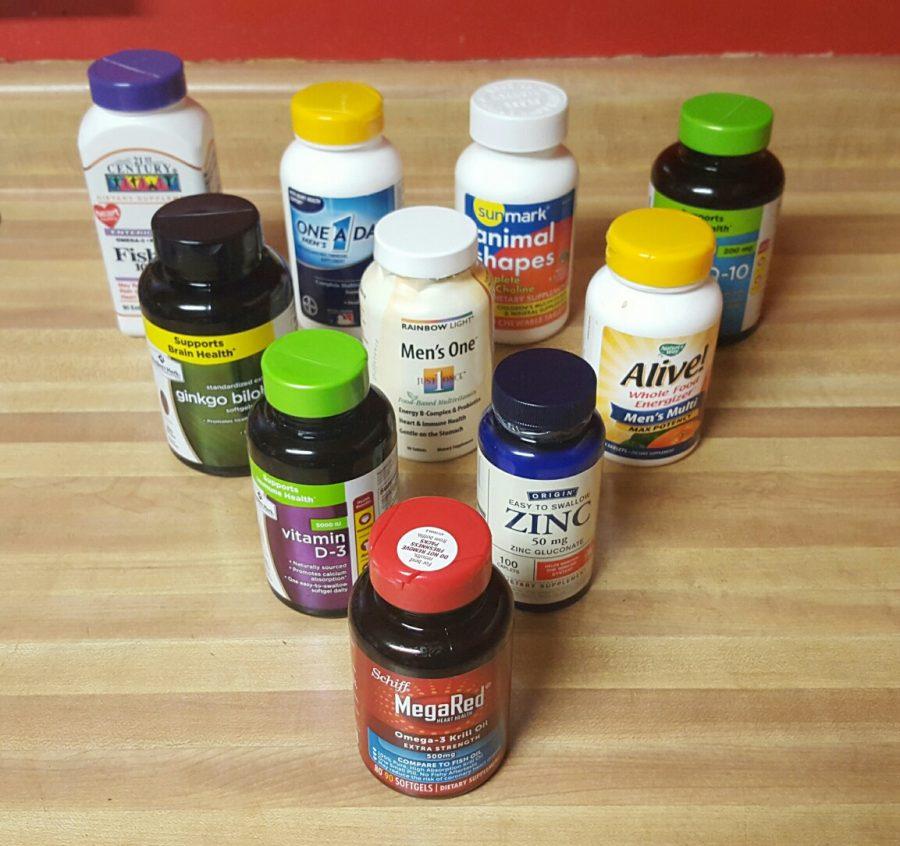The American Vitamin: Four Myths That Are Costing Us Billions
An unfortunate amount of vitamins.
Stop me if you’ve heard this one. A child wakes up in his bed with a nasty cough. The mom, hearing the child, rushes into the room to see what’s wrong. The mom asks, “Are you okay?” The child responds, “I don’t feel too well.” After examining the child for a solid ten seconds, the mom concludes that he just has a cold, should get some rest, and take some vitamin C.
Okay…but why? Don’t get me wrong, rest is definitely important, but what exactly does taking vitamin C do? Well according to our culture, it cures the cold! And how exactly does that work? Well, that’s where the fantasy ends.
As Americans, we love our vitamin supplements, believing that they can miraculously improve our health. In fact, a Gallup poll finds that about 50% of Americans take vitamin supplements, collectively spending a total of $28 billion a year on these pills, according to a 2013 LA Times article.

Unfortunately, a lot of the supposed “facts” surrounding vitamin supplements are about as real as the belief that Batman v. Superman was a good movie. (Hint: it wasn’t.)
So let’s examine four facts of fiction about America’s craze with vitamins.
Myth : Vitamin C helps fight the common cold.
In 2006, the makers of Airborne, vitamin supplements labeled as “the cure for the common cold,” were sued in a class-action lawsuit for false advertising, having to pay out $23 million dollars to consumers. (Sadly, they don’t make vitamins to cure a headache like that.)
But where did this myth come from? Well, in 1973, Linus Pauling, scientific celebrity and winner of two Nobel prizes, published Vitamin C and the Common Cold, claiming that taking 3,000 milligrams of vitamin C everyday would prevent the common cold. Although many now see that his claim was simply fueled by a maddening pursuit for extending life, because of his iconic statues in our culture, Americans ate his findings up.
Well…it’s time to spit them out.

Dr. Linus Pauling, professor at the California Institute of Technology, examines a molecular model in his laboratory in Pasadena, Calif.
According to a 2013 article published in The Atlantic, “at least 15 studies have now shown that vitamin C doesn’t treat the common cold.” In response to this enlightenment, the FDA, the American Academy of Pediatrics, the American Medical Association, the American Dietetic Association, the Center for Human Nutrition at the Johns Hopkins Bloomberg School of Public Health, and the Department of Health and Human Services no longer endorse the claim that vitamin C can prevent or treat colds.
Myth: More is More.
The very definition of “vitamins,” as stated by Merriam-Webster’s dictionary, are “various organic substances that are essential in minute quantities to the nutrition of most animals and some plants.” Yet, as the American saying goes, “We want more!”
Dr. Demetrius Albanes, a nutritional epidemiologist at the National Cancer Institute, sheds some light on this belief in an article written by Ian Landau of Reader’s Digest. After a series of large-scale studies, he notes that taking a high dosage of beta-carotene supplements can promote cancer in individuals. As these studies continued, it was also discovered that high doses of folic acid could increase the risk of colon cancer, while high doses of other vitamins could increase heart disease.
Simply put, there is no scientific evidence that shows that taking an increase of vitamin supplements is better for you–in fact, it’s worse. As the article so clearly puts it, “Vitamins are safe when you get them in food, but in pill form, they can act more like a drug…with the potential for unexpected and sometimes dangerous effects.”
Myth: Multivitamins make up for a poor diet
No, [insert negligent person’s name here], popping a multivitamin does not mean you don’t have to eat right. It’s no question that a healthy nutrition can be difficult to maintain when being constantly bombarded by busy days, the lure of fast food, and of course, the ever-so-typical mentality of “well, there’s nothing else to eat in the house.”
Nutrition is the basis of a healthy lifestyle, and simply taking vitamin supplements to “make life easier” cannot, and should not, be a viable alternative. That’s why Cynthia Sass of ABC News strongly affirms that “optimal nutrition is multifaceted,” and thus “supplements can’t possibly make up for an inconsistent diet or unhealthy habits.”
This means that skipping out on your mom’s side of sweet potatoes does not mean you can take a vitamin A supplement to “make it up.” A vitamin C supplement can’t beat a bit of fresh broccoli, and a small bowl of almonds or sunflower seeds always wins against vitamin E pills. It’s all about making sure that a nutritional diet comes first before vitamins are even considered into the equation.

A well stocked stand of vegetables and fruits
Myth: Feelings of depression, stress, or anxiety equate to a vitamin deficiency
The issue of mental health in America is no laughing matter. With about 1 in 5 Americans experiencing a severe mental disorder at some point during their life, according to the National Alliance on Mental Illness, the question of how to aid the issue is both an important and pervasive debate. Unfortunately, a tiny, “cure-all” pill is not always the solution.
There are a number of reasons that a person can feel as though their mental state is not up to par. Unhealthy lifestyle habits such as sleep deprivation, unmanaged stress, and even smoking can all contribute to the issue. In fact, in an article written by the Better Health Channel entitled “Vitamins – Common Misconceptions,” they find that the aforementioned feelings do not automatically stem from a vitamin deficiency, so taking a vitamin supplement such as B12 will not necessarily make the feelings disappear.
The article further explains that while vitamins can help those with serious mental illnesses cope with their illness, they cannot prevent them. In the case of major issues, it is crucial to consult your doctor or a professional on the matter, not a $25 bottle of B12 supplements.
With all being said, vitamins are not a fleeting fad nor a foolish endeavor. But like with most things in life, it all comes down to knowledge and moderation: the knowledge of when to take vitamins, and the ability to moderate the amount taken. So play it smart, and play it right. You wouldn’t only be saving your money, but ultimately, your health.









Kristin Heath • Apr 22, 2016 at 12:04 pm
It is true that no vitamin or mineral can “cure” any disease. It is the human body itself, with a healthy immune system, that does the “curing.” Vitamins and minerals are what support a healthy immune system, as well as a healthy body.
But before you go “dispelling myths” about a few specific instances where they may not be beneficial, it is important to note the myriad of ways supplements can also be highly beneficial. I don’t think you will have any trouble finding articles that support that concept.
What is more alarming than the $28 billion that Americans spend on supplements? The $374 billion they spend on prescription medications. Nearly 70% of Americans take them, according to the Mayo Clinic.
With well over 125,000 deaths per year caused by prescription drugs (taken as prescribed), and nearly zero deaths caused by supplements, I would rather take my chances on supplements.
See: http://newsnetwork.mayoclinic.org/discussion/nearly-7-in-10-americans-take-prescription-drugs-mayo-clinic-olmsted-medical-center-find/
See: http://time.com/3819889/medicine-spending/
See: http://articles.mercola.com/sites/articles/archive/2012/04/23/defend-your-right-to-access-safe-dietary-supplements.aspx
Moti Begna • Apr 22, 2016 at 4:52 pm
I strongly agree with you on the overuse of prescription medication in America. The misinformation surrounding these pills, coupled with the pervasevness of their use, is a recipe for disaster.
With that said, the most important thing I took away from my research on vitamin supplements were also the misinformation and pervasevness surrounding them. I don’t want people to have to rely on vitamin supplements if it’s in relation to one of the myths I previously stated. There are many roads to take when It comes to supplements, but I believe some of those roads can be misguided.
In both cases (medication and vitamins), its all about education. This article was about giving awareness to some of the myths around vitamins–myths that others have done research for.